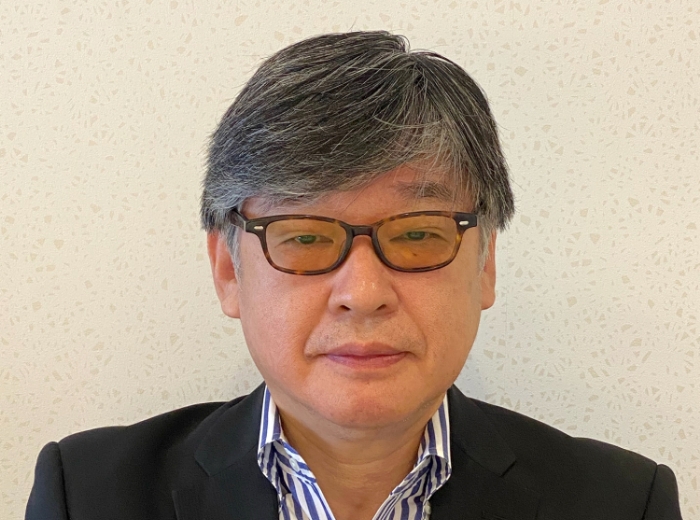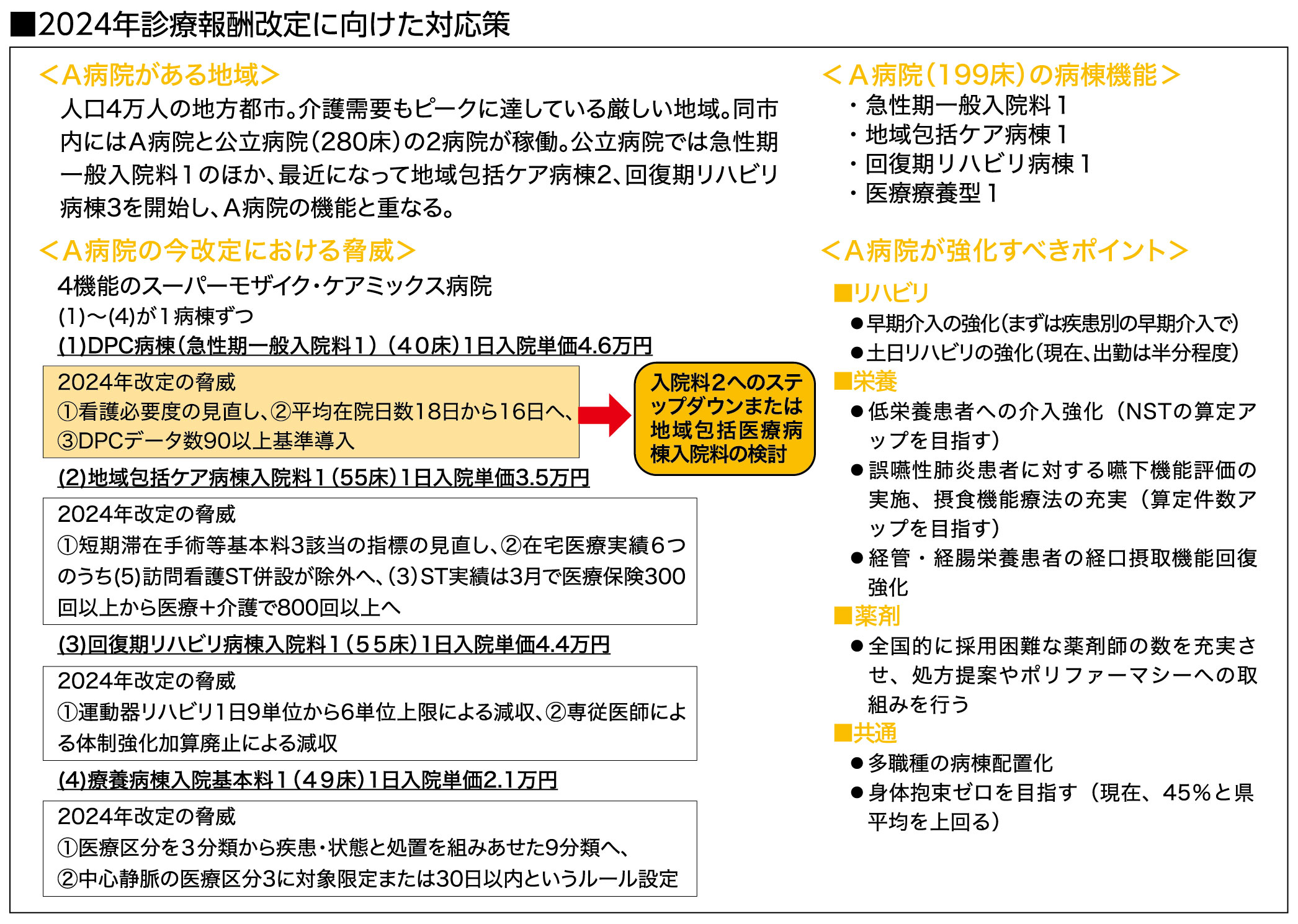ASOURCE®TIMES

株式会社MMオフィス 代表取締役
工藤 高
1982年日本大学経済学部卒業。河北総合病院医事係長、亀田森の里病院医事課長、経営企画室長など18年間に及ぶ病院勤務を経て99年より現職。専門は診療報酬側面からの病院経営戦略立案。700床の地域医療支援病院から100床未満のケアミックス病院まで全国20病院強のクライアントを持つ。『日経ヘルスケア』(日経BP社)巻頭コラムなど連載も多数。
2024年度診療報酬改定の新点数が6月1日から施行されます。様々な新点数項目見直しに加え、「地域包括医療病棟入院料」が新設されたことで病棟再編の新たな道筋が示された今回の改定を、病院経営コンサルタントの工藤 高氏は超メジャー級と評します。このポイントとともに病棟編成の見直しを迫られる急性期病院へのアドバイスを伺います。
ご存知のように2024年度は診療報酬に加え、介護報酬、障害福祉法のトリプル改定の年にあたります。さらに医師の働き方改革の施行、第8次医療計画の外来医療計画に基づく外来機能の明確化と連携、第9期介護保険事業計画の実施など「ポスト2025(2040年までの高齢者増加と多死社会)」を見据えたさまざまな改革が行われます。2024年度診療報酬改定は、介護報酬、障害福祉法だけでなく、これらの改革ともリンクする改定内容となっており、漢字一文字で表現するならば、まさに繋(つな)ぐの「繋」がふさわしいでしょう。
こうした背景のもと、今回の診療報酬改定は、高度急性期から回復期、慢性期、在宅医療・介護まで1本の柱が貫かれています。どのステージにおいても「医療・介護の連携」は当たり前、さらに「口腔・栄養・リハビリテーション・認知症ケア」への対応がすべてのステージで求められています。
一方、急性期病院が最も大きな影響を受けるのが入院基本料要件の見直しです。前回の2022年度診療報酬改定後、急性期一般入院料1(看護配置7対1)を算定する病床が全国で3300床増加しました。主な理由としては、①急性期充実体制加算において地域包括ケア病棟(以下、地ケア)の併設不可とされたため、地ケアを入院料1に戻した、②地ケア入院料に導入された減算を回避するために地ケアを入院料1へ戻したことなどが挙げられます。
今回の入院基本料の見直しでは、急性期一般入院料1を算定する病床こそが急性期病床に資すると位置づけ、新基準を満たせない病棟を実質的に排除する改定内容となっています。厚生労働省のシミュレーションによると1〜2割ほど減少する見込み案が4つ示されていました。同時に、昨年末に新たな入院料の創設が浮上し、「地域包括医療病棟入院料」が新設されました。答申書付帯意見では、この新設を踏まえ、看護配置「10対1」の急性期一般病棟の機能を明確にしたうえで「再編を検討する」ことが明記されています。
つまり、今回の診療報酬改定によって病棟再編の新たな道筋が示されたわけで、新入院料創設の超メジャー級の改定です。急性期一般入院料1以外の入院料2〜6の病床は、これから数度の診療報酬改定を繰り返す中で「地域包括医療病棟」と「地域包括ケア病棟」に振り分けられていくでしょう。
2024年度診療報酬改定を踏まえ、それぞれの急性期病院がやるべきことは看護必要度等の経過措置が終了する9月末までに病棟編成を見直し、どの入院料を選択するのかを判断することです。なかでも入院単価が低い‟自称・急性期病院”は急性期一般入院料1の看護必要度新基準を満たせない可能性が高いため、経営判断が必要です。そのモデルとして4機能を有するケアミックス型のA病院(199床)の事例を示しますので、1つの参考にしてください。
病棟再編を検討する際には地域の医療提供体制や競合状況を考慮し、自院の役割と機能を明確にすることが肝心です。選択によってはビジョン(あるべき姿)そのものを変えざるを得ないこともあるでしょう。しかし、9月末までに新たなビジョンを打ち出すのは他院の動向等もあり、時間的に厳しいため、当面は変更しやすい方法で乗り切り、中長期的に新ビジョンに基づいて病棟編成を考えていくのが賢明です。
一方で、診療報酬改定の度に医療現場からは「届出医療(加算)やチーム医療に取り組んでも採算が取れない」といった嘆きも聞こえてきます。しかし、加算とは厚生労働省からのメッセージ(政策誘導)であり、医療機関がやるべきことにインセンティブ(報酬)がついてきます。やるべきことをやっていない(加算を届出しない)医療機関の方が赤字が多いでしょう。また、チーム医療は「医療の質」を、タスクシフティングは「労働生産性」を向上させる目的があることを理解することも必要です。
いずれにせよ、今回の超メジャー級の診療報酬改定を乗り越えるためには、単なる点数の多寡ではなく、医療政策、人口動態、他院の動向といった見地から診療報酬全体を捉えたうえで、うまく対応していくことが重要です。
